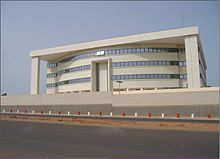
Back اقتصاد غينيا بيساو Arabic Economía de Guinea-Bisáu AST Economia de Guinea Bissau Catalan Economía de Guinea-Bisáu Spanish Économie de la Guinée-Bissau French Economía de Guinea-Bissau Galician Գվինեա-Բիսաուի տնտեսություն Armenian Ekonomio di Guinea-Bisau IO ギニアビサウの経済 Japanese 기니비사우의 경제 Korean
 Central Bank of Guinea-Bissau in Bissau | |
| Currency | CFA franc |
|---|---|
| Calendar Year | |
Trade organisations | AU, African Development Bank, ECOWAS, World Bank, IMF, WTO, Group of 77 |
| Statistics | |
| GDP | [1] |
GDP growth |
|
GDP per capita | $1,989 (PPP) (2017 est.) Rank: 214 (2017 est.) |
GDP by sector | agriculture (50%) industry (13.1%) services (36.90%) (2017 est.) |
Population below poverty line | 67% with less than $2/day (2015 est.) |
| 50.7 (2010) | |
Labour force | 731,300 (2013 est.) |
Labour force by occupation | agriculture (82%) industry and services (18%) (2000 est.) |
| Unemployment | N/A |
Main industries | food processing, beer, soft drinks |
| External | |
| Exports | |
Export goods | fish, cashew nuts, gold, ores, lumber (2019) |
Main export partners | (2019.) |
| Imports | |
Import goods | refined petroleum, rice, soups and broths, wheat products, malt extract |
Main import partners | (2019) |
Gross external debt | |
| Public finances | |
| Revenues | $246.2 million (2017 est.) |
| Expenses | $263.5 million (2017 est.) |
| Economic aid | $170.2 million (31 December 2012 est.) |
All values, unless otherwise stated, are in US dollars. | |
The economy of Guinea-Bissau comprises a mixture of state-owned and private companies.[3] Guinea-Bissau is among the world's least developed nations and one of the 10 poorest countries in the world, and depends mainly on agriculture and fishing. Cashew crops have increased remarkably in recent years, and the country ranked ninth in cashew production for the year 2019.[4]
Guinea-Bissau exports to Asia non-fillet frozen fish and seafood, peanuts, palm kernels, and timber. License fees for fishing in their sea-zone (Gulf of Guinea) provide the government with some small revenue. Rice is the major crop and staple food. Due to European regulations, fish and cashew-nuts exports to Europe are totally prohibited as well as agriculture products in general.
- ^ "Guinea-Bissau - the World Factbook".
- ^ "Global Economic Prospects, January 2020 : Slow Growth, Policy Challenges" (PDF). openknowledge.worldbank.org. World Bank. p. 147. Retrieved 22 January 2020.
- ^ "Guinea-Bissau". Retrieved 27 October 2019.
- ^ "FAOSTAT". www.fao.org. Retrieved 2021-07-05.